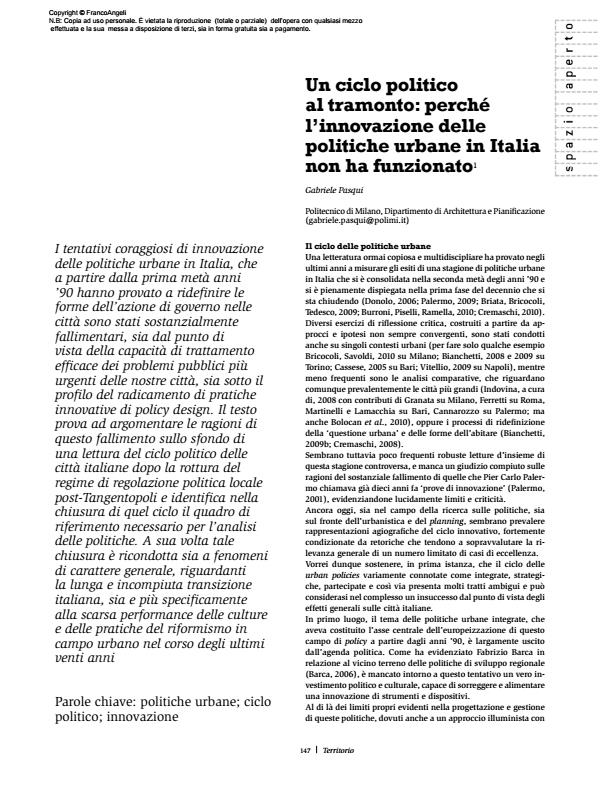The decline of a policy cycle: why innovation of urban planning in Italy has failed
Journal title TERRITORIO
Author/s Gabriele Pasqui
Publishing Year 2011 Issue 2011/57 Language Italian
Pages 10 P. 147-156 File size 524 KB
DOI 10.3280/TR2011-057019
DOI is like a bar code for intellectual property: to have more infomation
click here
Below, you can see the article first page
If you want to buy this article in PDF format, you can do it, following the instructions to buy download credits

FrancoAngeli is member of Publishers International Linking Association, Inc (PILA), a not-for-profit association which run the CrossRef service enabling links to and from online scholarly content.
Courageous efforts to innovate Italian urban planning, attempting from the first half of the 1990s to redefine urban government action methods, were largely unsuccessful. This was true both in terms of the ability for effective handling of the most urgent public problems in Italian cities and with respect to establishing innovative policy design practices. The article seeks to describe the reasons for this failure with a contextual analysis of the political cycle in Italian cities after the demolition of the local political regulation system subsequent to the ‘Tangentopoli’ corruption scandal. The end of that cycle is seen as the context required for policy analysis. In turn, that closure is traced back to phenomena of a general nature inherent to the long and incomplete Italian transition, and more specifically to the poor performance of the urban sector culture and practice reforms of the past 20 years. Keywords:
Keywords: Urban policies; political cycle; innovation
- Ripensare le politiche di sviluppo locale in Italia: un approccio territoriale-relazionale Filippo Celata, Ugo Rossi, in ARCHIVIO DI STUDI URBANI E REGIONALI 112/2015 pp.11
DOI: 10.3280/ASUR2015-112002 - Sperimentalismo e realismo: politiche possibili per il quartiere Crocetta Gabriele Pasqui, in TERRITORIO 70/2014 pp.57
DOI: 10.3280/TR2017-070009 - The Quality of Territorial Policies in Europe’s Periphery Mauro Tebaldi, Marco Calaresu, pp.45 (ISBN:978-3-030-62646-4)
- Citizenship and governance at a time of territorialization: The Italian local welfare between innovation and fragmentation Lavinia Bifulco, in European Urban and Regional Studies /2016 pp.628
DOI: 10.1177/0969776414531969 - Community entrepreneurship in sustainable food places Luca Tricarico, Stefano Quaglia, Lorenza Maria Sganzetta, in TERRITORIO 87/2019 pp.105
DOI: 10.3280/TR2018-087017 - Come accompagnare il cambiamento urbano? Simonetta Armondi, in TERRITORIO 70/2014 pp.37
DOI: 10.3280/TR2017-070005 - Imprese di comunità come fattore territoriale: riflessioni a partire dal contesto italiano Luca Tricarico, in CRIOS 11/2016 pp.35
DOI: 10.3280/CRIOS2016-011004 - Percorsi, risultati e incertezze nella pianificazione strategica a Pesaro Fiorenza Maria Martufi, in PRISMA Economia - Società - Lavoro 2/2013 pp.125
DOI: 10.3280/PRI2012-002010 - Innovation dynamics in regional policies for urban regeneration: experiences from Italy Angela Barbanente, Nadia Caruso, Laura Grassini, Elena Pede, in Planning Practice & Research /2022 pp.673
DOI: 10.1080/02697459.2021.2018172 - Urban Planning as a Trading Zone Claudio Calvaresi, Linda Cossa, pp.95 (ISBN:978-94-007-5853-7)
- Luoghi, specificità, integrazione: sul quartiere Crocetta e la riqualificazione urbana Francesca Governa, in TERRITORIO 70/2014 pp.52
DOI: 10.3280/TR2017-070008 - Land use, energy retraining and new instruments of negotiation in Italy: The case of Trieste Riccardo Laterza, in Land Use Policy /2018 pp.138
DOI: 10.1016/j.landusepol.2017.10.030
Gabriele Pasqui, Un ciclo politico al tramonto: perché l’innovazione delle politiche urbane in Italia non ha funzionato in "TERRITORIO" 57/2011, pp 147-156, DOI: 10.3280/TR2011-057019